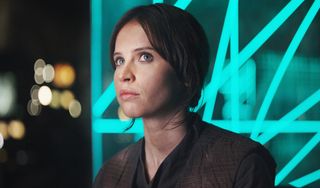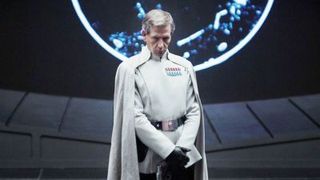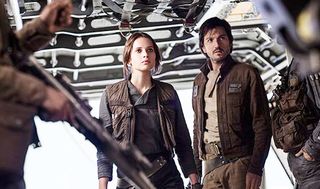***The following article contains spoilers for Star Wars Rogue One***
One of the biggest criticisms levelled at Star Wars: Rogue One is this: we already know what happens. While that’s a gross reduction of an entire, two hour movie, the point stands that everyone who has seen the original, 1977 Star Wars film will be aware that - yes - the Rebels manage to steal the Death Star plans from the Empire, which results in their eventual victory. It’s a win, right? A good ending. And as such, that will colour everything that happens in Rogue One, from start to finish. So, are we still entertained? Or just waiting patiently for the inevitable gratification to happen?
Ok, because I have to, I’m now going to spoil large swathes of Rogue One for you. But hey, you knew what happens anyway, right? I’d actually argue that smart filmmakers (and - to be clear - Gareth Edwards is a very, very smart filmmaker) can use these preconceptions to their advantage. We know the outcome of the movie, sure, and that carries with it a certain amount of assumptions. On top of that, the viewer thinks they know Star Wars when they first sit down to watch it, so there’s further scope for giving people something they don’t expect.

Rogue One would have been an absolute failure if it gave viewers something they anticipated, because it exists in a part of the Star Wars timeline that fans are already familiar with. Sure, there are cheeky nods to the original movies, to please fans but because the core is so radically different from other Star Wars movies (while cleverly retaining the right elements to make it feel canon) it sows seeds of illogical doubt in our minds. ‘Hang on - will this play out like I thought?’ On top of that, the unpredictable nature of the film - in that it subverts what we think we know about Star Wars - forces us to focus on the present. That’s a huge, huge accomplishment. If we sat through Rogue One exclusively focused on the destination, then we wouldn’t be enjoying the journey… and the journey is what makes and breaks a prequel like this.
In a way, then, movies actually have the capacity to entertain us more if we’re not constantly searching for the big plot twist or climactic end-point. As a viewer we can feel more comfortable knowing what the end game is, and that allows us to focus on the moment to moment narrative of the film. It’s an opportunity other recent movies have grasped to varying degrees of success. We all know what happens at the end of the Hobbit Trilogy, for example, but while Peter Jackson filled the three films with more action and adventure than you can shake a wizard’s staff at, they felt unnecessarily bloated. There is too much new stuff, an excess of improvisation, and that means the series loses its focus (not to mention that it creates more plot holes than actual Hobbit holes). It’s a fine line to tread. People came to The Hobbit expecting to see an adventure about a handful of underdogs, fighting a dragon, but what we get is a bit of that to placate the source material, and a handful of war-by-numbers battles that had no real impact or relevance. To drag out the run time, to justify the movies’ independence from the book.

The key difference between The Hobbit and Rogue One is that of focus and intent. Rogue One delivers on its promise of telling the story behind the theft of the Death Star plans, but does it in a consistent way. From the first scene to the last, it shows the dark side of the Star Wars universe, a perfect counter-point to the lighter episodes 4-7. It doesn’t try to imitate them, but does things its own way. The Hobbit feels like it’s constantly warring against the source material, trying to create something new to stave off the feeling that viewers know how it all ends, but Rogue One definitely feels like it is the source material.
But The Hobbit is based on a book, and Rogue One isn’t… it’s not the same. Well, that’s certainly true (although Jackson takes massive liberties with the novel) but, to an extent, most movies follow a specific pattern or template. The end of a film is largely predictable from the start. Is it an action movie? The good guys are probably going to win. A romance? The two stars will likely get together. A comedy? Things will go wrong, laughs will be had, but everything will probably work out in the end. Again, movies that embrace this concept and focus on the journey are usually the ones we remember most fondly. Example? Groundhog Day, one of the greatest rom-coms ever, takes great delight in toying with the viewer by repeating the same day over and over. Sure, it’s a narrative device, but we always know Phil and Rita will eventually get together. The filmmakers know that too, and constantly give us a ‘will they, won’t they’ scenarios, as we live Phil’s desperate attempts to break his selfish curse. Such is the power of the journey, we begin to doubt that Phil can ever convince Rita he’s right for her (plus, it leaves uncomfortable thoughts in the viewer’s mind of whether it’s right to manufacture perfection, taking a little of the sheen off the inevitable love between the pair).

Truly great movies are the ones that make the inevitable surprising, that give us a different pay-off to the one we ‘knew’ we’d get at the start. Rogue One, again, does this brilliantly. Not only does it wipe out every character we really care about, something no Star Wars movie - or pretty much any movie - dares to do, it also shows us how close we were to losing the entire premise of the original film. Something we’ve just accepted as casual fact gets shown in a whole new light. When Vader storms the disabled Rebel capital ship, we’re not prepared for the savagery of the attack and the desperation with which the stolen plans are evacuated. It’s utterly brutal how Vader rips through the Rebel crew, and their screams that accompany the frantic passing of the data card still ring in your ears long after the movie finishes.
We see Leia’s ship pull away as Vader stands thwarted on the docking ramp. The connection between Rogue One and the original movie is made, and the famous Rebel victory is complete. Except it’s one of the most hollow, harrowing defeats in cinema, made more pyrrhic by contrast to Star Wars’ traditionally emphatic ‘good triumphs over evil’ victories. So, yes, we always knew how Rogue One would play out - just as we did a bunch of other great movies - but we never could have predicted how that climax would have made us feel, or that the journey could have been so… surprising.


